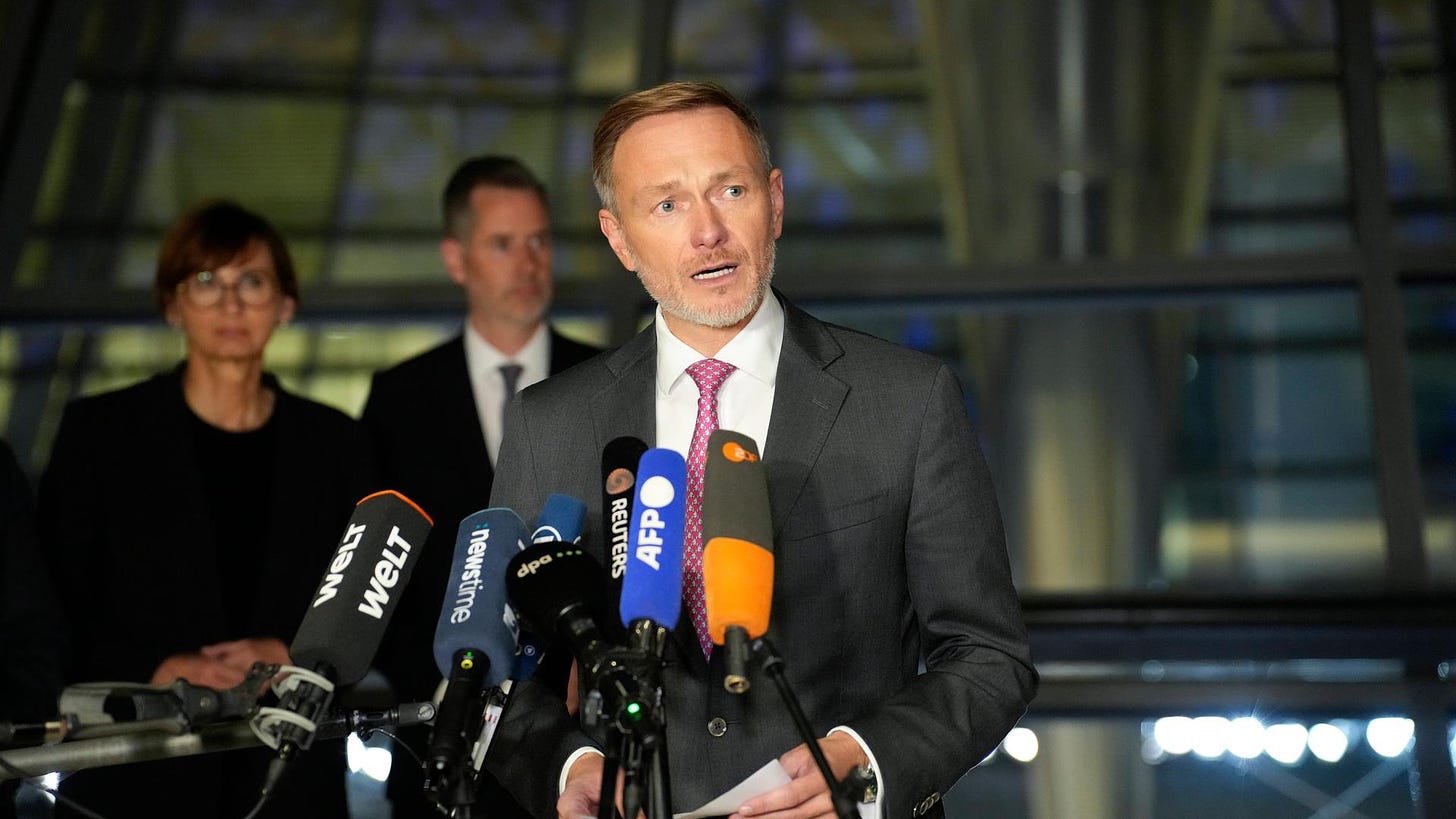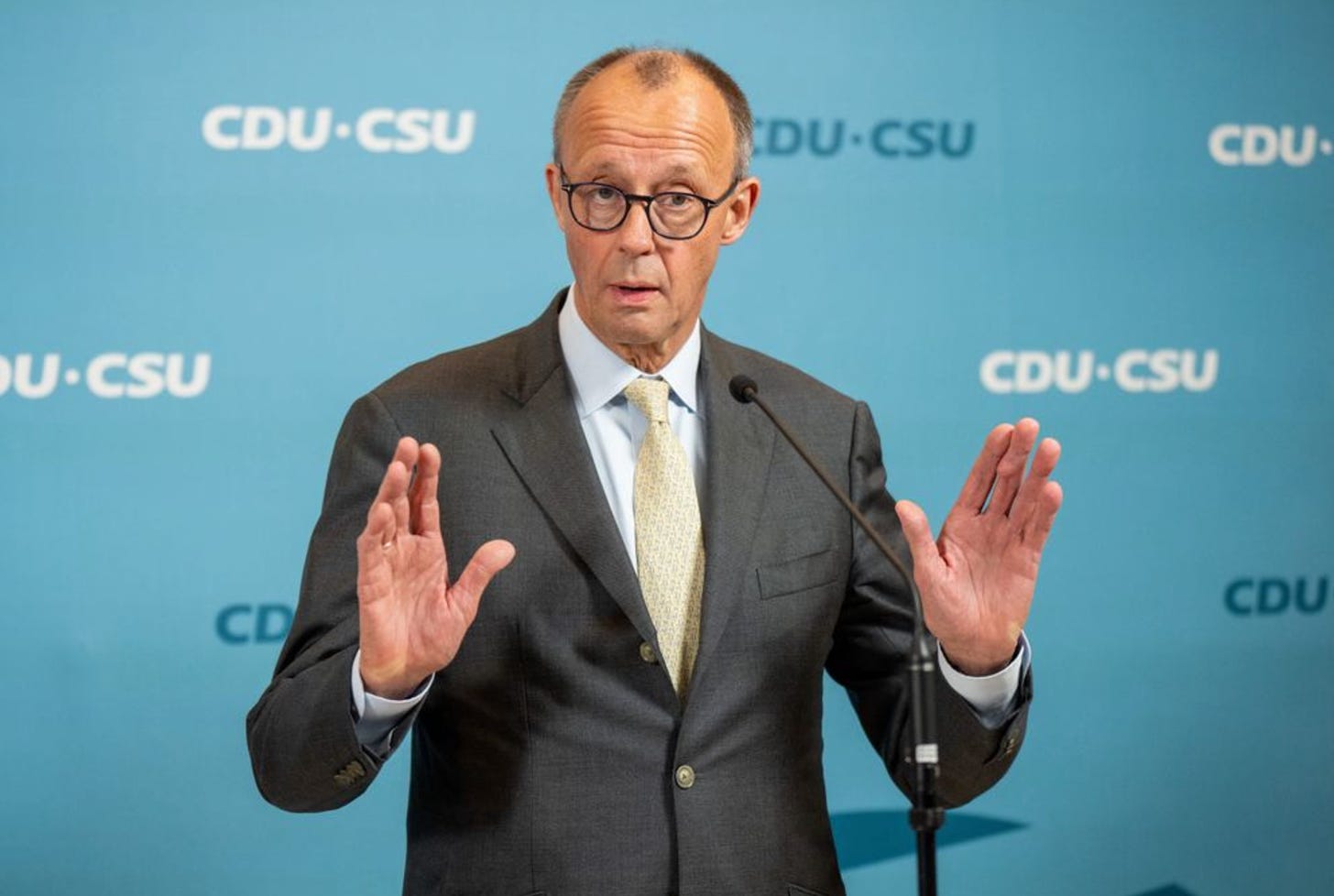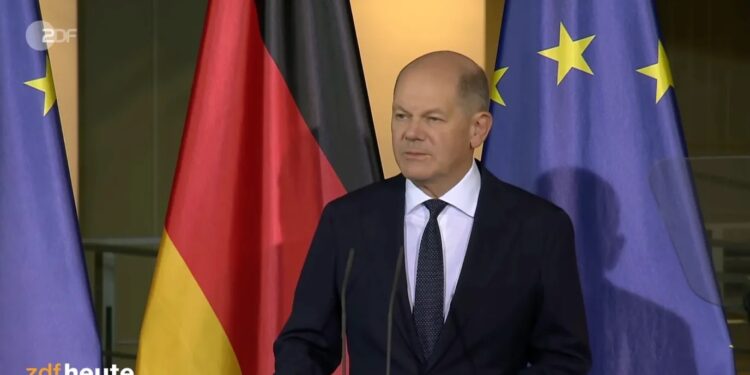The German traffic light coalition – named for the red Social Democrats (SPD), the yellow market-liberal Free Democrats (FDP) and the green Greens – is history. It collapsed three days ago, late in the evening on November 6th, when Chancellor Olaf Scholz (SPD) fired his Finance Minister Christian Lindner, who is also the head of the FDP. The Free Democrats left the Government, leaving the SPD and the Greens to limp along until new elections. Nobody knows quite when these will happen.
Scholz said that the FDP had “Too often shouted down the necessary compromises with publicly staged disputes and loud ideological demands.” He said that Lindner specifically had “broken his trust” by “too often blocking laws for the wrong reasons” and “engaging in small-minded party political tactics”.
Lindner responded that Scholz himself had staged the crisis, pleading that the budgetary concessions Scholz demanded of him would have violated his oath of office.

Thus the most unpopular, ineffective and openly ridiculous government ever to disgrace the Federal Republic of Germany meets its ignominious end. I would love to say that this happened because of Donald Trump’s election, the failure of the energy transition or the migration crisis. That would make this post more exciting. While those things did not help, what crushed these incompetent clowns in the end was something much more mundane: they ran out of money.
The traffic light has been a dysfunctional monstrosity from its inception. It is emblematic of post-Merkel German politics, in which the centre-Right Christian Democrats (CDU) have triangulated their way to the Left, leaving a great part of their conservative constituents out in the cold. Alternative für Deutschland grew to fill the vacuum, but as the establishment parties refuse to work with them, parliamentary majorities have become an ever scarcer commodity. As long as the cordon sanitaire stands, Germany will have one government after the other like the traffic light, in which politicians with diametrically opposed political philosophies form coalitions for the sheer purpose of denying the rabble their political voice.
The SPD narrowly won the 2021 elections, when the Greens were also near the height of their powers. These two Left-wing parties were logical partners, but they did not command a majority. Thus they had to go knocking at the door of the FDP – the only other willing party with enough seats to make the math work. While the FDP represent the interests of fiscal conservatives, the Greens and the Social Democrats love taxes and debt, because taxing people and taking on debt is the only way they can spend money. They had ambitious plans of an accelerated energy transition and of increasing social entitlements. They were going to build 400,000 more apartments. They were going to vomit forth a great wealth of industrial subsidies intended to ease German industry into her glorious post-carbon phase.
To square the circle and get the FDP on board with these fantasies, they hatched a plot that was just a titch too clever: taxes would stay as they are and there would be no new deficit spending. Instead, the Greens and the SPD would fund their projects by reappropriating unused Covid-era credit authorisations secured under the Merkel Government.
In this way, they hoped to avoid Germany’s strict debt brake. Since 2009, our Basic Law holds that budget deficits cannot exceed 0.35% of GDP unless there is some real or imagined emergency like the Covid supercold. Reappropriating emergency Covid credit authorisations for non-emergency renewables and subsidies was always legally doubtful, and the CDU (since 2021 banished to the opposition) sued. Last year, the Federal Constitutional Court in Karlsruhe ruled their budget trickery unconstitutional. This deprived the coalition not only of their money, but also of their entire purpose and reason for being.
Since that ruling in November 2023, the traffic light has been dead in the water. They’ve had to stand by as energy prices have skyrocketed and watch impotently as they became the most reviled government in the history of the Federal Republic. They have had to endure their repudiation in the European elections and then their total humiliation in the state elections in Thüringen, Saxony and Brandenburg.
The Greens and the SPD wanted to stop the bleeding by declaring a new emergency to evade the debt brake so they could get back to spending money. The war in Ukraine was the perfect occasion. The FDP, however, would not agree. Christian Lindner insisted that judges would never buy this pretence and that it was unconstitutional. Probably he could no longer agree to the deficit spending scheme even if he wanted to. As bad as the traffic light had been for the Greens and the Social Democrats, it had all but destroyed the FDP, and the internal pressure on him was immense.
In an effort to save himself and make his party relevant again, Lindner last week submitted to his coalition partners an 18-page manifesto for achieving an “economic turnaround” in Germany. It was an outright attack on the entire political programme of the SPD and the Greens. He called for tax reductions, an end to Green industrial subsidies and delays to Green energy transition schemes.
These were demands to which the SPD and the Greens could not agree. Publicly, Lindner tried to backtrack, insisting that his paper was only the starting point for negotiations. Behind the scenes, though, he took a harder line, demanding substantial concessions from his leftist partners. Finally, Chancellor Scholz had enough. He demanded that Lindner, as his Finance Minister, sign off on his emergency debt brake evasion scheme. When Lindner refused, Scholz sacked him, and the Government that was dead in spirit finally died also in body.
As I said, there will be new elections, in March at the latest. Olaf Scholz, who must dissolve the Government and trigger snap elections by bringing (and failing) a confidence vote, is playing for time. Among other things, his election officials are pleading that they will need many months to assemble the required paper. That is not a joke.
The CDU, the FDP and Alternative für Deutschland could put a stop to this farce and oust Chancellor Scholz with their own constructive vote of no confidence. The CDU, however, refuses to take this logical step, because it would amount to appointing CDU head Friedrich Merz as interim chancellor with the help of AfD votes, and that is forbidden by the absurdities of the cordon sanitaire. As always, the determination of the CDU to marginalise the AfD merely enhances the power of the loathed and discredited German Left.

When we finally find enough paper to hold new elections, the CDU will surely come out on top, and Merz will very likely be the new Chancellor. Everything else is uncertain and depends on two great unknowns:
The first of these, is whether the FDP will even make it over the 5% hurdle to be represented in the Bundestag. In 2021, the FDP won 11.4% of the vote, but the traffic light has ground them to dust, and the latest polls tend to place them around 3–4%. The second unknown, is whether the SPD will be strong enough to give the CDU a majority by themselves. If elections were held today, it looks like the CDU and the SPD together would fall around the 50% mark, or just short of it.
If the likely case that the FDP is voted out of the Bundestag and the SPD is too weak, the CDU will have to govern with the Greens as well, forming a dreaded “Kenya coalition”. Yes, that’s right: The Greens and the SPD would return to rule after all of the destruction they have wrought, and only the FDP would be punished for the folly of the past three years. Again, all of this is thanks to the cordon sanitaire, which is totally about preventing the return of fascism and has absolutely nothing to do with keeping German politics resolutely on a leftoid Green course contrary to what everybody wants.
Some people have told me that a Merz government would nevertheless constitute an important correction towards the centre-Right, so in conclusion I hope you will allow me to dash your hopes on the remorseless reefs of reality.
The CDU have been aping the AfD and railing against mass migration for months. They even proposed draft legislation “to limit the illegal influx of third-country nationals to Germany”. One of the last acts of the FDP before the Government collapsed, was to help shoot this legislation down in committee. Now, however, the FDP are in the opposition, and suddenly there is a theoretical majority for this law – if only the FDP joins the CDU, the AfD and the Bündnis Sahra Wagenknecht (BSW) in supporting it. Limiting migration is important, right? Strangely, though, the CDU have developed a mysterious anxiety about introducing any legislation until the elections, because they don’t want to pass anything with votes from the AfD or the migration-sceptical BSW. The CDU are happy to oppose migration, in other words, as long as their opposition has no chance of producing any real, tangible laws that will do anything to stop migration in the real world.
Maybe the CDU will at least do something about climatism, though? Maybe they’ll wind back all the green insanity we’ve had to endure since 2021, like the building heating ordinances? Here again, hoping would be very foolish. The CDU have now made it clear that they consider green policies on this front to be “irreversible”. They’ve been in secret talks with the Greens for months, and they’ve even produced a draft resolution confirming their support for green climate targets. They hope merely to shift the emphasis away from green industrial subsidies and specific technology requirements towards carbon pricing and emissions trading instead. They will also surely plead that some of the worst schemes – like the approaching ban on internal combustion engines – are EU-level policies and out of their hands.
You may have noticed, at this point, that there is a very long list of things that the CDU cannot do. There are the things they cannot do because they would require AfD votes, there are the things they cannot do because they need the Greens for their parliamentary majority and there are the things they cannot do because of the European Union and NATO and God knows what else. Germany has locked itself into a highly pernicious trap of its own making here, and it will be one hapless government into the buzzsaw after the other, until our politicians figure out how to govern again, or are replaced by literally anybody with a minimal capacity to act.
This article originally appeared on Eugyppius’s Substack newsletter. You can subscribe here.














To join in with the discussion please make a donation to The Daily Sceptic.
Profanity and abuse will be removed and may lead to a permanent ban.
The Great European Economic Powerhouse (Germany) totally ruined by GREEN Ideology and Mass Immigration. —-The UK are ignoring this lesson and will collapse in a heap as well.
“They were going to vomit forth a great wealth of industrial subsidies intended to ease German industry into her glorious post-carbon phase.”
An impossibility as perpetual motion does not exist. Perhaps Germany should not have closed down it’s nuclear power?
Associating the Green Party with a traffic signal, or a railway signal displaying a green aspect is ironic, is it not? After all, it’s almost the opposite for most industrialists! More like a yellow, followed by another one, and another one……..Then grinding to a halt at the next one.
Daily Skeptic: best English language commentary on Germany. Danke.
As far as I can see, the whole Western European, “progressive”, woke, net zero, pro-migration idea is one massive, unmitigated failure.
It simply doesn’t work.
It doesn’t matter that all the mainstream parties are behind it.
It doesn’t matter that the mass media supports it.
It doesn’t matter that all of its critics are censored, silenced, bullied, imprisoned.
It doesn’t matter that massive amounts of money and manpower are sacrificed to support it.
It still doesn’t work.
So, there are two possible routes ahead:
1.) Continue regardless and commit social and economic suicide. Adolph in the bunker with the cyanide capsule in the mouth and bullet in the head.
2.) Try something else.
That’s about it, in my opinion.
You are right and will be interesting to see how the Irish GE plays out at the end of the month.
I fear if you cancel and close down the opposite views it will lead to a more violent approach.
Too many people still asleep. We’re doomed.
The Greens have been given a kicking in the recent state elections and could fail to make the 5% needed to get any seats at all. And it took 71 days to form a government last time.
Habeck, Merz and Scholz are really DINO — different in name only. That’s also the reason why this pseudo-collapse of a governing coalition doesn’t matter at all. I don’t know to which degree German policy is decided by the UN and to which degree by the so-called American left (whose agendas seem to be – by-and-large – identical) but German (establishment) politicians are certainly just remote-controlled executing agents.